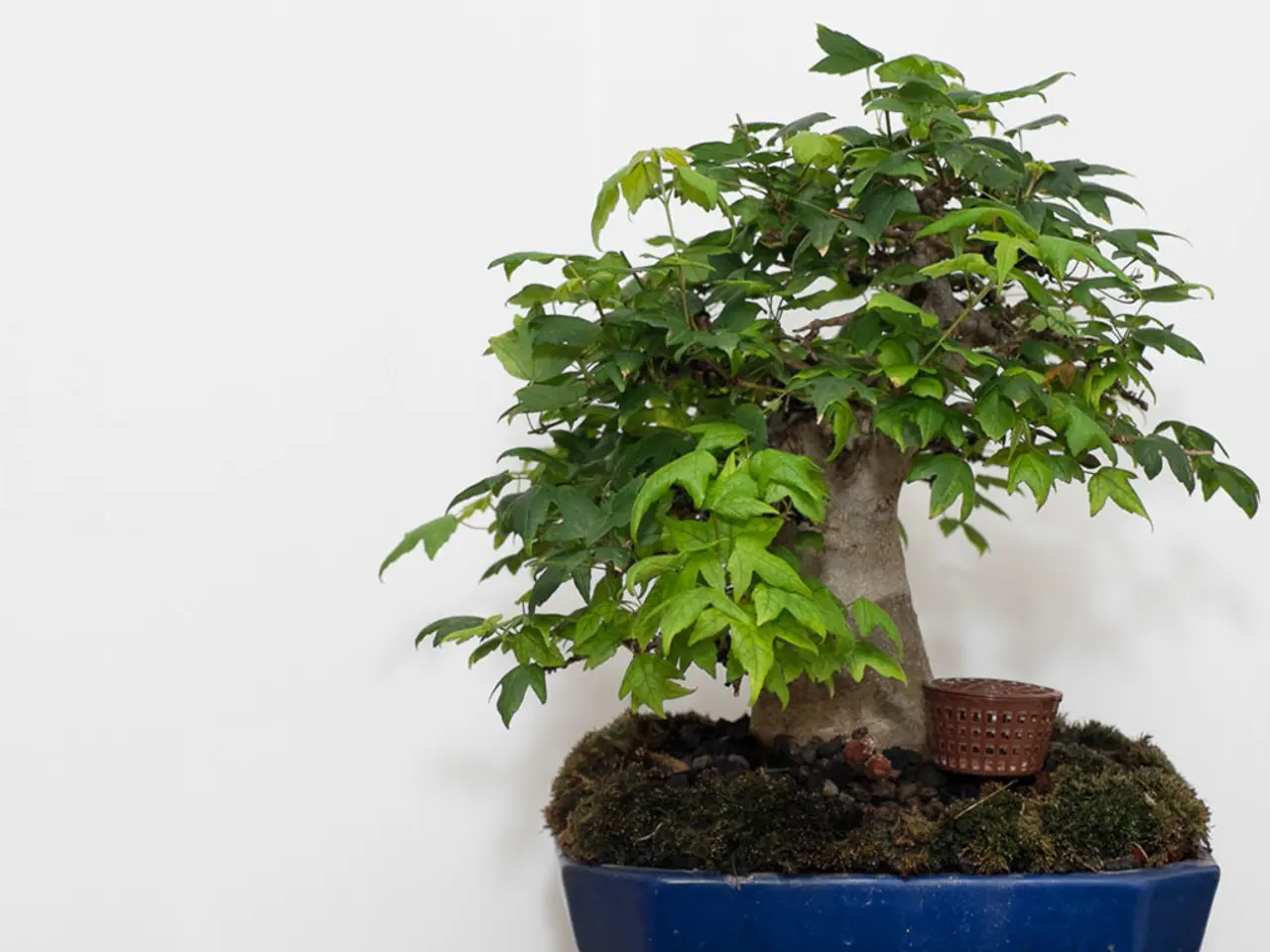Bonsai Malnutrition: Spotting and Rectifying Nourishment Shortages
Bonsai trees, the miniature masterpieces of horticulture, require a balanced diet of nutrients to maintain their health and stunning appearance. Despite their small size, bonsai trees are heavy feeders, and common nutrient deficiencies can lead to a range of issues.
One such deficiency is nitrogen deficiency, which can cause yellowing leaves, especially older ones, and stunted growth. Nitrogen is crucial for leafy growth, and its deficiency can lead to reduced leaf color and size. To combat this, bonsai enthusiasts should use a balanced fertilizer with a slightly higher nitrogen content during the growing season to promote healthy foliage.
Another common deficiency is iron deficiency, often resulting in yellowing leaves with green veins, a condition known as chlorosis. To correct this deficiency, iron-rich fertilizers or supplements are recommended.
Magnesium deficiency can also affect bonsai trees, causing leaves to turn yellow with green veins. Magnesium is essential for photosynthesis, and its absence can lead to a range of problems. Using magnesium-based fertilizers or supplements can help address this issue.
Potassium deficiency can cause weak, spindly branches and general poor health. Potassium aids in overall plant vigor and resistance to disease. To improve tree strength and resilience, consider including potassium-rich fertilizers in the feeding schedule.
Deficiencies in other nutrients like calcium and sulfur can also affect bonsai trees, though they are less common. These deficiencies can result in a range of symptoms, including leaf curl, stunted growth, and poor root development.
To prevent these deficiencies, bonsai trees should be fertilized regularly with a balanced bonsai fertilizer during the growing season (spring to fall), avoiding fertilization during winter dormancy. Organic fertilizers often prove superior to synthetic ones, as they release nutrients gradually, promoting sustainable growth and minimizing environmental impact.
Regular testing of soil pH and nutrient levels is also essential to ensure a balanced diet for the bonsai tree. Consider rotating fertilizer types, monitoring tree responses to fertilization, and frequently testing soil pH and nutrient levels to prevent nutrient imbalances.
When selecting a fertilizer, bonsai enthusiasts must consider factors such as soil type, tree species, and desired growth outcomes. Organic fertilizers release nutrients slowly, providing a steady supply, while liquid fertilizers offer rapid absorption, making them suitable for trees in dire need of immediate nutrition.
During the dormant season, fertilization can be reduced to once a month to conserve energy and promote root growth. Different seasons and growth stages require varying levels of nutrients, and optimizing fertilizer timing and frequency is critical to synchronizing nutrient availability with a bonsai tree's growth cycles and seasonal demands.
Bonsai trees have different nutrient needs at different stages of development. Nitrogen-rich fertilizers promote vigorous growth during juvenile phases, while mature trees require balanced formulas emphasizing phosphorus and potassium for robust root development and blooming.
It's important to note that some bonsai trees may respond better to organic fertilizers, while others may thrive with synthetic options. Regular houseplant fertilizers may provide some essential nutrients but often lack the balanced ratio of nitrogen, phosphorus, and potassium tailored to bonsai trees' unique needs.
Synthetic fertilizers can cause rapid, unbalanced growth and soil degradation, pollute soil and water, and harm beneficial soil microbes. They are often less expensive and more widely available but may not be the best choice for long-term bonsai health.
In conclusion, maintaining a balanced diet for bonsai trees is crucial for their health and appearance. Regular fertilization with a balanced bonsai fertilizer, regular testing of soil pH and nutrient levels, and careful consideration of the tree's needs and the fertilizer's composition can help ensure a long and healthy life for these intricate creations.
Science plays an integral role in understanding the specific nutrient requirements of bonsai trees for optimal health and wellness. Nutrition, including nitrogen, iron, magnesium, potassium, calcium, and sulfur, is essential for the growth and development of these miniature masterpieces of horticulture. Regular fertilization with a balanced bonsai fertilizer, science-backed soil testing, and careful nutrient management are key strategies to maintain the health and beauty of bonsai trees.




